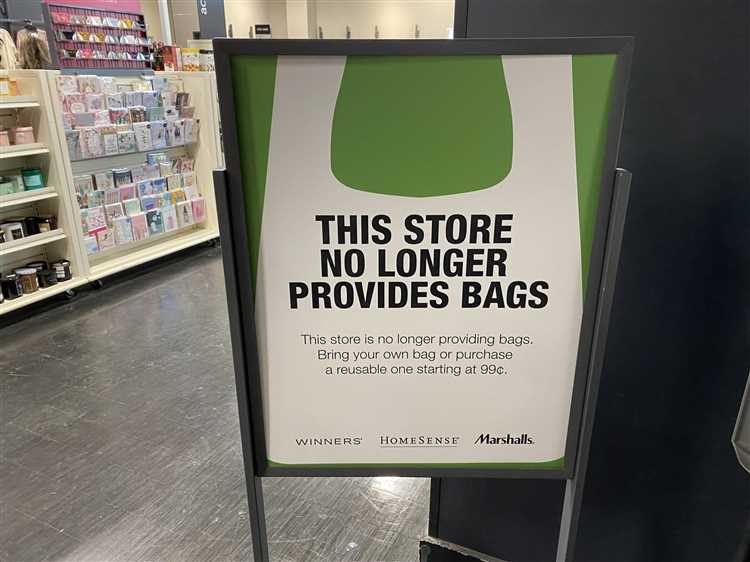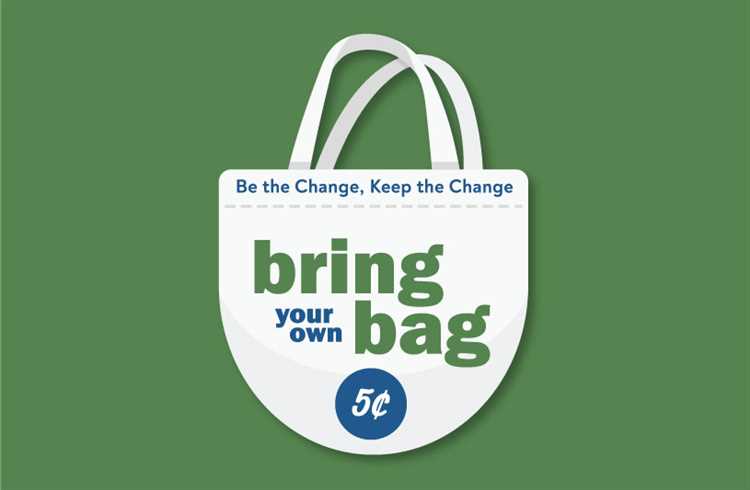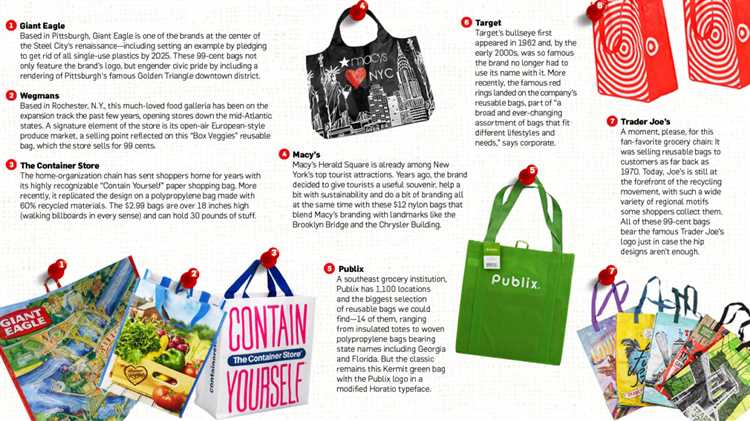
Plastic pollution is one of the most pressing environmental issues our planet faces today. Single-use plastic bags are a significant contributor to this problem, as they take centuries to decompose and often end up in our oceans and landfills.
In response to this crisis, many countries and cities around the world have implemented bans on plastic bags, encouraging consumers to opt for reusable alternatives instead. This has led to a surge in retail innovation, as businesses strive to provide sustainable solutions that meet both consumer demands and environmental goals.
By eliminating plastic bags from their operations, retailers are not only reducing their carbon footprint, but also raising awareness among their customers about the importance of adopting eco-friendly practices. This shift towards sustainability has opened up a world of opportunities for innovative solutions in the retail industry.
One such solution is the introduction of reusable bags made from eco-friendly materials such as organic cotton or recycled plastics. These bags are not only durable and long-lasting, but also significantly reduce the amount of single-use plastic waste generated. They can be branded with the retailer’s logo, turning them into a walking advertisement for their commitment to sustainability.
Another innovative approach is the implementation of refill stations in stores. Instead of purchasing a new plastic bottle every time, consumers can bring their own containers and refill them with household products such as cleaning supplies or personal care items. This not only reduces plastic waste, but also allows consumers to save money in the long run, making it a win-win solution for both the environment and their wallets.
Furthermore, some retailers have embraced the concept of package-free shopping. Customers can bring their own containers or use compostable bags to purchase goods in bulk, eliminating the need for unnecessary packaging. This reduces plastic waste and also encourages consumers to be more mindful of their consumption habits. It also provides retailers with an opportunity to educate their customers about the benefits of a zero-waste lifestyle.
In conclusion, the plastic bag ban has paved the way for retail innovation and sustainable solutions in the industry. By replacing single-use plastic bags with reusable alternatives and introducing refill stations and package-free shopping, retailers are taking a proactive stance in reducing their environmental impact. This not only benefits the planet, but also enhances their brand image and fosters customer loyalty. With continued collaboration and innovation, we can create a sustainable solution for the future and make plastic pollution a thing of the past.
- Plastic Bag Ban and Retail Innovation
- The Environmental Impact of Plastic Bags
- 1. Pollution of Land and Waterways
- 2. Harm to Wildlife
- 3. Energy Consumption and Greenhouse Gas Emissions
- 4. Unsightly Litter
- Legal Initiatives to Reduce Plastic Bag Usage
- 1. Plastic Bag Bans
- 2. Taxes and Levies
- Consumer Habits and the Plastic Bag Ban
- Retailers’ Role in Promoting Sustainable Alternatives
- Innovations in Retail Packaging
- 1. Eco-friendly Materials
- 2. Minimalist Packaging
- Future Perspectives and Global Sustainability Goals
- Q&A:
- What are some of the negative impacts of plastic bags on the environment?
- Why is banning plastic bags a sustainable solution for the future?
- What are some retail innovations that can help reduce the use of plastic bags?
- Do plastic bag bans have any negative consequences for businesses?
- Are there any alternatives to plastic bags that are both sustainable and cost-effective?
- Why are plastic bags being banned?
Plastic Bag Ban and Retail Innovation
In recent years, there has been a growing global movement towards reducing plastic waste and promoting sustainability. One of the solutions that many countries and cities have adopted is the banning of single-use plastic bags. This ban has not only been a positive step towards reducing environmental pollution but has also created opportunities for retail innovation.
The plastic bag ban has forced retailers to come up with alternative solutions for packaging and carrying goods. One of the most popular and innovative solutions is the introduction of reusable bags. These bags are made from more durable materials such as canvas or nylon, and are designed to be used multiple times. Retailers have even started to offer incentives to customers who bring their own reusable bags, such as discounts or loyalty points. This not only encourages customers to be more mindful of their plastic consumption but also promotes brand loyalty and customer satisfaction.
| Benefits of the Plastic Bag Ban and Retail Innovation | |
|---|---|
| 1. Environmental Impact | By reducing the use of plastic bags, the ban has significantly decreased plastic waste and pollution, leading to a healthier environment. |
| 2. Economic Savings | Retailers have seen long-term cost savings by eliminating the need to purchase and dispose of single-use plastic bags. |
| 3. Innovation and Differentiation | Retailers that have embraced the ban and implemented innovative solutions have gained a competitive edge, attracting environmentally-conscious customers. |
| 4. Brand Image and Sustainability | Participating in the plastic bag ban demonstrates a commitment to sustainability, which can enhance a retailer’s brand image and reputation. |
Overall, the plastic bag ban has not only addressed the urgent need to reduce plastic waste but has also spurred retail innovation and created opportunities for sustainable solutions. By embracing reusable bags and other alternative packaging options, retailers can lead the way towards a more eco-friendly future.
The Environmental Impact of Plastic Bags
Plastic bags have become an omnipresent part of our daily lives, with staggering amounts being used across the globe. However, their convenience comes at a significant environmental cost. Here, we delve into the detrimental effects plastic bags have on our planet.
1. Pollution of Land and Waterways
Plastic bags are non-biodegradable and can persist in the environment for hundreds of years. When improperly disposed of, they often end up in landfills or find their way into our oceans, rivers, and lakes. The accumulation of plastic bags contributes to the pollution of these ecosystems, posing a threat to wildlife and marine life.
2. Harm to Wildlife
Marine animals, birds, and land creatures frequently mistake plastic bags for food. When ingested, they can cause blockages in their digestive systems, leading to starvation or death. Entanglement in plastic bags also poses a significant threat to marine life, causing injuries, trapping animals, and hindering their ability to swim or fly.
3. Energy Consumption and Greenhouse Gas Emissions
The production of plastic bags requires immense amounts of energy and resources. This process contributes to greenhouse gas emissions, further exacerbating climate change. Additionally, the transportation and disposal of plastic bags result in additional energy use and emissions, making them an unsustainable choice.
4. Unsightly Litter
Plastic bags are often seen littered in urban and natural environments, detracting from the beauty of our cities and landscapes. They are not only an eyesore but also a clear indication of our society’s overreliance on single-use plastics.
Overall, the environmental impact of plastic bags is undeniable. To mitigate their harmful effects, it is crucial to adopt sustainable alternatives and promote responsible consumption habits. By reducing our reliance on plastic bags, we can move towards a greener and more sustainable future.
Legal Initiatives to Reduce Plastic Bag Usage
As the negative impact of plastic bags on the environment becomes increasingly evident, governments around the world have implemented various initiatives to reduce their usage. Here are some notable legal measures taken:
1. Plastic Bag Bans
Many countries and cities have implemented outright bans on the use of plastic bags. These bans prohibit shops from providing plastic bags to customers and encourage the use of reusable alternatives. This approach has proven effective in reducing plastic bag consumption and has led to positive environmental outcomes.
2. Taxes and Levies
Some governments have introduced taxes or levies on plastic bags to discourage their use. By imposing additional costs on plastic bags, it incentivizes consumers to choose reusable alternatives. The revenue generated from these measures can be allocated towards environmental initiatives or raising awareness about the harmful effects of plastic bags.
Moreover, a combination of these legal initiatives has proved even more effective in reducing plastic bag usage. The success of these measures has led to greater public awareness about the environmental impact of plastic bags and has prompted individuals, businesses, and communities to actively seek sustainable solutions.
It is important to note that these legal initiatives are just the beginning, and the ultimate goal should be to foster a cultural shift towards sustainable practices and the adoption of eco-friendly alternatives.
Consumer Habits and the Plastic Bag Ban
Since the introduction of the plastic bag ban, consumer habits have undergone significant changes. Prior to the ban, plastic bags were a go-to option for shopping and carrying items. They were cheap, convenient, and readily available. However, the ban has forced consumers to adopt new behaviors and seek alternatives to plastic bags.
One of the immediate effects of the ban was an increase in the use of reusable bags. Consumers are now more likely to bring their own bags to stores or purchase reusable bags offered by retailers. This shift has been beneficial for the environment, as reusable bags significantly reduce plastic waste and pollution.
Another noticeable change in consumer habits is the increased emphasis on purchasing durable and sustainable products. With the plastic bag ban, consumers have become more aware of the impact of single-use items on the environment. As a result, there has been an uptick in demand for products that are eco-friendly and have a longer lifespan.
Additionally, the ban has encouraged consumers to explore alternative packaging options. Many retailers have adopted innovative packaging solutions such as biodegradable bags, paper bags, or boxes made from recycled materials. This push towards sustainable packaging not only reduces plastic waste but also sends a message to consumers that brands are committed to environmental responsibility.
Furthermore, the plastic bag ban has kickstarted conversations and education around the importance of reducing waste and adopting sustainable practices. Consumers are now more knowledgeable about the harmful effects of plastic bags on wildlife and ecosystems. This increased awareness has resulted in a change in consumer mindset, with many individuals actively seeking out ways to minimize their ecological footprint.
Overall, the plastic bag ban has had a significant impact on consumer habits. It has encouraged the use of reusable bags, promoted the purchase of sustainable products, and stimulated innovation in packaging solutions. With continued efforts to promote sustainability, consumer habits are expected to continue evolving in a positive direction, ultimately leading to a more environmentally conscious society.
Retailers’ Role in Promoting Sustainable Alternatives
Retailers play a crucial role in promoting sustainable alternatives to plastic bags. As front-line sellers in the consumer market, they have the power to influence consumer behavior and drive demand for eco-friendly options.
One way retailers can promote sustainable alternatives is by offering reusable bags made from biodegradable and recyclable materials. These bags can be stylish and durable, providing a fashionable and long-lasting alternative to single-use plastic bags. Retailers can display these bags prominently at checkout counters and offer incentives, such as discounts or loyalty points, to encourage customers to make the switch.
Additionally, retailers can partner with local organizations and manufacturers to develop innovative solutions. They can collaborate on research and development projects to create new packaging materials that are both sustainable and cost-effective. By actively seeking out and supporting new initiatives, retailers can play a crucial role in driving innovation and finding sustainable alternatives to plastic bags.
Another way retailers can promote sustainable alternatives is through educational campaigns. They can provide information to customers about the negative impact of single-use plastic bags on the environment and highlight the benefits of using reusable options. Retailers can use their platforms to raise awareness and educate consumers about the importance of making conscious choices for a greener future.
Furthermore, retailers can implement recycling programs in their stores. They can provide designated bins for customers to dispose of their old plastic bags, which can then be properly recycled. By taking responsibility for the lifecycle of the products they sell, retailers can demonstrate their commitment to sustainability and show customers that they are part of the solution.
In conclusion, retailers have a significant role to play in promoting sustainable alternatives to plastic bags. By offering reusable bags, collaborating on research and development, conducting educational campaigns, and implementing recycling programs, retailers can drive change and help create a more sustainable future.
Innovations in Retail Packaging

Retail packaging has long been a source of environmental concern due to its excessive use of plastic and non-recyclable materials. However, in recent years, there have been significant innovations in retail packaging that aim to address these sustainability issues.
1. Eco-friendly Materials

One of the key innovations in retail packaging is the use of eco-friendly materials. Retailers are increasingly opting for biodegradable and compostable packaging options that can be easily recycled or decomposed. These materials include bio-based plastics, paper-based packaging, and plant-based materials. By using these materials, retailers can reduce their reliance on single-use plastic packaging and minimize their environmental impact.
2. Minimalist Packaging

Another innovation in retail packaging is the shift towards minimalist packaging designs. Many retailers are rethinking their packaging strategies and adopting a “less is more” approach. By reducing the amount of packaging material used and eliminating unnecessary components, retailers can minimize waste and decrease their carbon footprint.
Minimalist packaging not only benefits the environment but also appeals to eco-conscious consumers who are looking for sustainable alternatives. Retailers can use this as a marketing tool to showcase their commitment to sustainability and attract environmentally conscious shoppers.
Overall, the innovations in retail packaging are driving the industry towards a more sustainable future. By embracing eco-friendly materials and adopting minimalist packaging designs, retailers can reduce their environmental impact and contribute to a greener world.
Future Perspectives and Global Sustainability Goals

The plastic bag ban and retail innovation have paved the way for a more sustainable future. As we look ahead, it is important to consider the global sustainability goals that can be achieved through these initiatives.
One key goal is to reduce plastic waste and its impact on the environment. By implementing a ban on plastic bags, we can significantly decrease the amount of plastic that ends up in our oceans and landfills. This reduction in plastic waste will have a positive long-term effect on the health of ecosystems and wildlife.
Another important goal is to promote the use of reusable and biodegradable alternatives. Retailers can encourage customers to bring their own bags or provide them with eco-friendly options such as paper or fabric bags. This shift towards reusable alternatives will not only reduce waste but also promote a more sustainable and environmentally friendly lifestyle.
In addition to reducing plastic waste, the plastic bag ban and retail innovation can also contribute to the achievement of other global sustainability goals. For example, by promoting the use of eco-friendly packaging materials, retailers can help reduce greenhouse gas emissions associated with the production and disposal of plastic bags.
Furthermore, these initiatives can also encourage consumers to make more sustainable choices in their everyday lives. By raising awareness about the environmental impact of plastic bags and providing alternative options, consumers can become more conscious of their consumption habits and make eco-friendly choices.
In conclusion, the plastic bag ban and retail innovation offer a promising future for global sustainability goals. By reducing plastic waste, promoting reusable alternatives, and raising awareness about sustainable choices, these initiatives can contribute to a more sustainable and environmentally friendly future.
Q&A:
What are some of the negative impacts of plastic bags on the environment?
Plastic bags have numerous negative impacts on the environment. They are made from non-renewable resources like crude oil, and their production contributes to pollution and greenhouse gas emissions. Once discarded, plastic bags can take hundreds of years to decompose, causing harm to wildlife and marine ecosystems. Additionally, plastic bags are often littered and end up in landfills or as marine debris, further damaging the environment.
Why is banning plastic bags a sustainable solution for the future?
Banning plastic bags is a sustainable solution for the future because it helps reduce the consumption of non-renewable resources and minimizes the environmental impact of plastic waste. By promoting the use of reusable bags or biodegradable alternatives, we can significantly decrease the amount of plastic waste that ends up in landfills and oceans. This not only protects ecosystems, but also reduces pollution and conserves energy in the production of new plastic bags.
What are some retail innovations that can help reduce the use of plastic bags?
There are several retail innovations that can help reduce the use of plastic bags. Many stores offer incentives for customers to bring their own reusable bags, such as discounts or loyalty points. Some retailers have also introduced biodegradable or compostable bags made from renewable materials like cornstarch. Additionally, technological advancements have led to the development of reusable bags that are durable, stylish, and compact, making them more convenient for customers to use.
Do plastic bag bans have any negative consequences for businesses?
Plastic bag bans may have some initial costs for businesses, such as the need to invest in alternative packaging options. However, in the long run, these bans can bring several benefits to businesses. By promoting sustainability and environmental responsibility, businesses can enhance their reputation and attract environmentally conscious customers. Additionally, reducing the use of plastic bags can lead to cost savings and operational efficiencies for retailers.
Are there any alternatives to plastic bags that are both sustainable and cost-effective?
Yes, there are several alternatives to plastic bags that are both sustainable and cost-effective. Reusable bags made from materials like canvas, cotton, or jute are a popular choice as they can be used multiple times and last for years. Some retailers offer paper bags, which are biodegradable and recyclable. Another option is to use biodegradable bags made from plant-based materials like cornstarch or vegetable oils. These alternatives may have a higher upfront cost, but they are more sustainable in the long term.
Why are plastic bags being banned?
Plastic bags are being banned because they are harmful to the environment. They take a long time to decompose and often end up in landfills or oceans, polluting the land and water.
